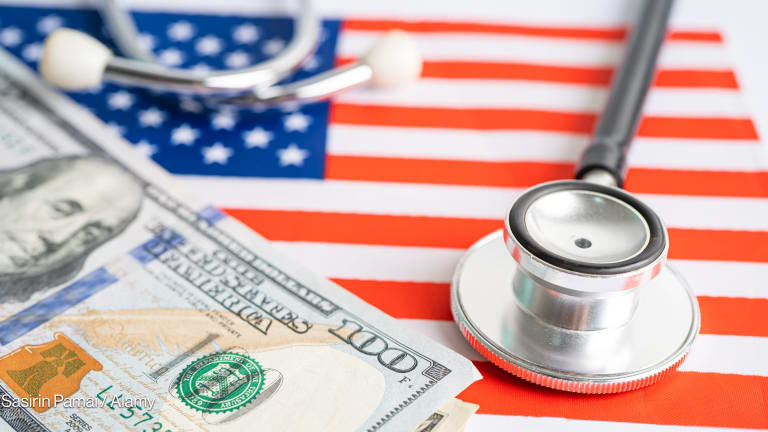
On Sept. 22, U.S. President Joe Biden will lead an international summit on the global COVID-19 response. We urge him and other leaders to step up action to support safer, better working environments for health workers around the globe. This summit needs to go beyond just applauding the workforce: It should deliver on what health workers need to respond to COVID-19 and to prepare for the next pandemic.
Globally, at least 115,000 health workers have died from COVID-19 since the pandemic began, and many others have chosen to leave the health workforce. For example, the International Council of Nurses reports that 20% of national nurses associations saw increased numbers of nurses leaving the profession in 2020.
And in the United States, 3 out of 10 health workers have considered leaving the profession in the past year. We’re facing a dire shortage of health workers when we’re facing a pandemic and attempting the biggest and fastest vaccine rollout in human history.
Right now, only 2% of people in low-income countries have received their first COVID-19 vaccine dose, compared to more than 65% in high- and upper-middle-income countries. Vaccine supplies are expected to increase substantially by the end of this year. But, alarmingly, vaccine readiness is at 75% or below in 13 African countries, according to the World Health Organization. And in West Africa, fragile health systems have slowed the vaccine rollout.
Financing is part of the answer. Vaccine delivery will cost around $3 billion to reach just 20% of the population, according to WHO. And the G-20 High Level Independent Panel has determined that we’ll need to invest $19 billion in international aid to strengthen health systems over the coming five years for pandemic prevention and preparedness. However, the U.S. Agency for International Development Office of Health Systems still languishes for lack of adequate funding.
If we’re going to build the resilient health systems we need worldwide to end this pandemic — and to be ready for the next one — we need to ensure the safety of health workers and respect for their rights.
Here are four things global health organizations and world leaders can do now to improve health worker safety — and improve global health security for us all.
1. Provide health workers with PPE and vaccines
Spot-checks in 32 countries last year found that only 45% of health facilities were equipped with masks, gloves, disinfectants, and sanitizer — four essential items of personal protective equipment. That is unacceptable. We need U.S. government donors and partners to improve forecasting for PPE needs and to finance them sufficiently.
The Center for Global Development reports that 916,000 active community health workers serve 40% of the African population. These workers would need more than 300 million pieces of PPE to protect themselves and their communities while maintaining essential services.
It is also imperative to ensure that all health workers are prioritized for COVID-19 vaccination in every country, including community health workers, who are often not included in the formal health system. WHO data from 140 countries suggests just 1 in every 8 health workers is fully vaccinated, the vast majority being in high-income nations.
2. Protect health workers from sexual harassment and discrimination
Seventy percent of health and social care workers are women, but only 25% of leadership roles are headed by women. Right now, over one million women are working unpaid in the health sector.
But the inequities don’t stop at pay. For women health workers, sexual harassment and gender-based discrimination at work are far too common. In a 2020 study, about 45% of female nurses providing home care, for example, are likely to experience sexual harassment over the course of their careers.
Health workers and students need safe, decent working environments — this could be achieved by putting policies in place to prevent and address gender-based discrimination and sexual harassment at work. USAID’s 2021 guidance on gender and COVID-19 is a critical advance in this arena. Now we need to make sure this is implemented at the country level.
3. Let health workers advocate for themselves
In 2020, there were health worker strikes in at least 84 countries, in many cases due to poor working conditions. In Nigeria, doctors began a strike last month protesting unpaid salaries and the lack of insurance benefits for relatives should they die from COVID-19. These strikes leave communities without access to lifesaving health care — and they are a common outcome when health workers’ voices aren’t heard.
But when health workers are part of strong unions and advocacy groups, they have a seat at the table and are able to advocate for themselves. In Kenya, IntraHealth International’s Human Resources for Health program has been working to bring together unions, county leaders, national institutions, faith-based organizations, private sector partners, and others to create more dialogue and prevent more strikes.
If we’re going to build the resilient health systems we need worldwide … we need to ensure the safety of health workers and respect for their rights.
—We’ve trained health management teams and union leaders to negotiate, resolve labor disputes, and navigate the inner workings of policies and governance. And it works: Kenyan counties now involve union leaders in the drafting of policy, guidelines, and strategy development. Twenty-five counties now have work councils that engage with health worker unions to address looming grievances.
IntraHealth has also trained 15 health workers from around the world in storytelling for advocacy. They’ve gone on to use those skills to make their voices and needs heard at the highest levels, including in media and TV shows such as “The Tonight Show Starring Jimmy Fallon.”
Building health workers’ advocacy skills means they can also more effectively promote increased investment in the health workforce, safe working conditions, and broader access to the COVID-19 vaccines.
4. Gather data needed to protect health workers
Safety starts at the top, with strong systems driven by data. Countries need access to data that will help them surge health workers during outbreaks, forecast the need for PPE, and get vaccines to those who need them.
During the beginning of the pandemic, IntraHealth worked with the ministries of health in Mali and Kenya to use data from iHRIS, Demographic and Health Surveys, and other national information systems to identify populations at risk of severe symptoms of COVID-19, model the timing and magnitude of outbreaks in their countries, and rapidly mobilize and prepare health workers for the response.
This is the kind of data-driven action we need for a successful vaccine rollout.
Global leaders — including those gathering at the 76th United Nations General Assembly and at the G-20 meeting this fall — must go beyond rhetoric to respect the rights of health workers and ensure their needs are included in planning and financing for a ramped-up response.
Health workers need to be able to deliver complex care. But to do that, they need to be cared for, too.
Visit the Building Back Health series for more coverage on how we can build back health systems that are more effective, equitable, and preventive. You can join the conversation using the hashtag #BuildingBackBetter.









